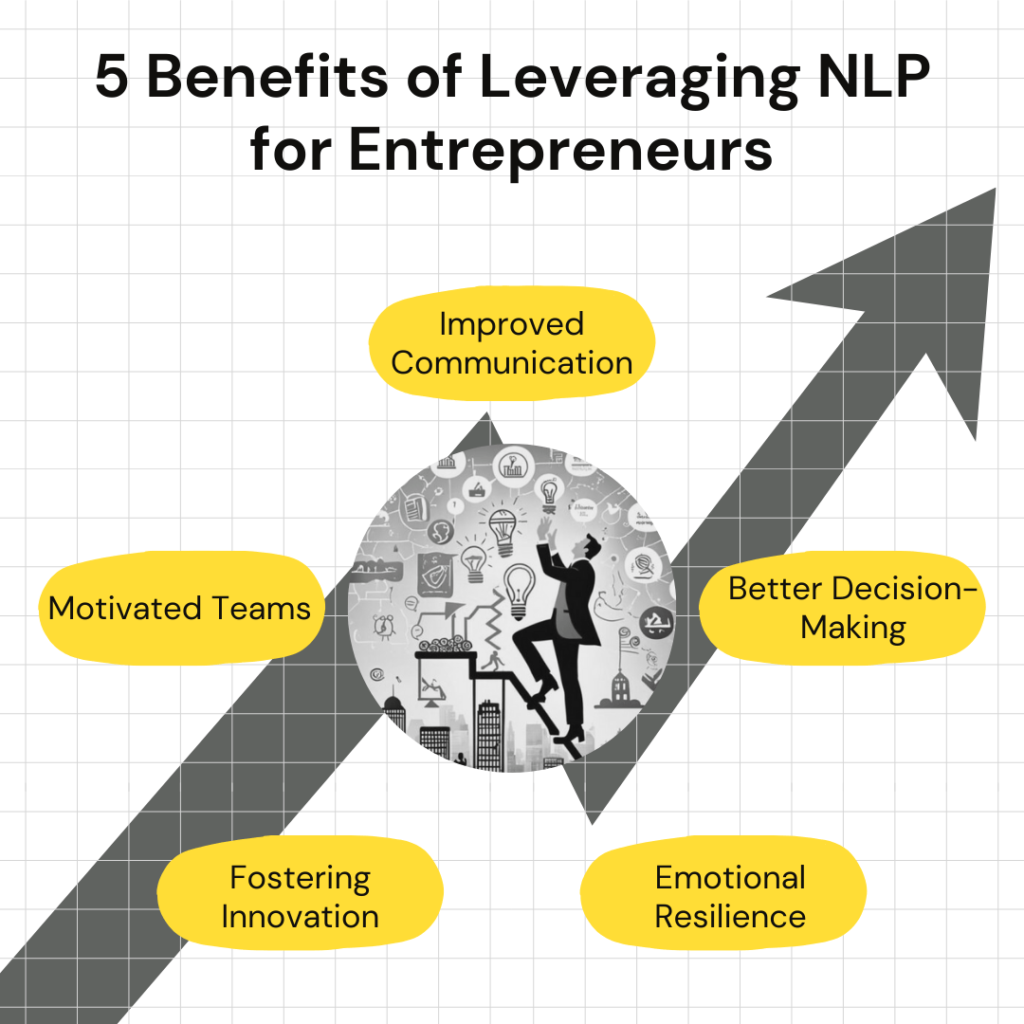As an entrepreneur, your success isn’t just about executing plans—it’s about how well you communicate, innovate, and lead. Neuro-Linguistic Programming (NLP) offers a powerful framework that goes beyond surface-level leadership tactics.
By understanding and leveraging the deep connections between language, thoughts, and behavior, NLP empowers entrepreneurs to lead with purpose and precision, unlocking new levels of business growth.
How NLP is Revolutionizing Entrepreneurial Leadership

NLP transforms leadership by providing insights into the psychological and linguistic patterns that influence decisions, interactions, and behavior. It enables entrepreneurs to fine-tune their communication and leadership styles based on how people process information. By recognizing these patterns, leaders can foster stronger connections with their teams, improve negotiation outcomes, and fuel sustainable growth across their organizations.
One practical example is how NLP helps entrepreneurs move beyond simple problem-solving to understanding why certain communication strategies resonate with different people. Leaders who master NLP can predict responses more effectively, thus enhancing team engagement and client interactions.
Key Applications of NLP in Entrepreneurial Leadership
Enhancing Communication and Negotiation
Communication is more than just delivering a message—it’s about creating genuine connection and influence. NLP techniques such as mirroring, where you subtly reflect someone’s body language and tone, and anchoring, where you associate positive emotions with specific words or gestures, can drastically improve the effectiveness of your communication.
For example, during high-stakes negotiations, using NLP to mirror the other party’s communication style can build trust and rapport. This approach allows entrepreneurs to convey their message in a way that aligns with the listener’s mindset, making negotiations smoother and more successful.
Market and Competitor Analysis
In today’s data-driven world, understanding your market and competition is key. NLP techniques, such as sentiment analysis and text mining, allow entrepreneurs to analyze customer feedback and competitor actions more deeply. Instead of just tracking quantitative metrics, NLP enables leaders to extract qualitative insights from massive amounts of unstructured data, such as social media posts, reviews, and forums.
For instance, an entrepreneur might use NLP to identify emerging customer preferences or spot gaps in competitor offerings, giving them the edge to create more targeted, high-value products or services.
Streamlining Customer Service with Chatbots and Virtual Assistants
The rise of NLP-powered chatbots and virtual assistants is transforming customer service operations across industries. These tools not only answer customer inquiries in real-time but also enhance the overall customer experience by offering more personalized interactions. NLP algorithms help these virtual assistants understand complex language patterns, enabling them to resolve issues, anticipate needs, and even suggest new products or services.
Entrepreneurs can use these tools to scale customer service operations while ensuring consistent, high-quality support, ultimately leading to greater customer satisfaction and retention.
Predictive Analytics for Business Growth
One of the most valuable aspects of NLP is its ability to provide predictive insights. NLP-driven predictive analytics helps entrepreneurs forecast trends, identify customer behavior patterns, and anticipate market shifts. By using NLP to process vast amounts of unstructured data—like social media sentiment or online reviews—businesses can make more informed, forward-looking decisions.
For example, an entrepreneur might use NLP to predict shifts in consumer demand for certain products, allowing them to adjust marketing strategies or inventory ahead of time, staying ahead of competitors and boosting profitability.
Leadership Development and Talent Management
Leadership is not just about leading others—it’s about mastering self-awareness and emotional intelligence. NLP provides tools to help leaders identify and manage their own emotional states and better understand their teams’ motivations. Techniques like perceptual positions—viewing a situation from multiple perspectives—allow leaders to resolve conflicts and make decisions with empathy.
In the realm of talent management, NLP helps entrepreneurs build stronger relationships with their teams by improving internal communication and understanding what truly motivates individuals. This level of connection fosters a culture of high performance and continuous growth.
Benefits of Leveraging NLP for Entrepreneurs

Improved Communication
NLP techniques help entrepreneurs communicate with greater precision and influence, fostering deeper trust and engagement with clients, teams, and stakeholders. Leaders who use NLP are more likely to deliver messages that resonate and inspire action.
Better Decision-Making
By increasing self-awareness and understanding unconscious biases, NLP enables entrepreneurs to make more strategic and objective decisions. This level of clarity helps leaders align their choices with long-term business goals.
Emotional Resilience
NLP offers tools for managing stress and emotional challenges. State management techniques allow leaders to maintain composure and clarity in high-pressure situations, giving them the resilience needed to handle crises effectively.
Fostering Innovation
NLP encourages leaders to break through mental barriers and limiting beliefs that stifle creativity. By reframing challenges as opportunities, NLP fosters a culture of innovation where continuous improvement is the norm.
Motivated Teams
Understanding the individual motivations of team members allows entrepreneurs to create more personalized leadership strategies, resulting in higher engagement, satisfaction, and performance within the organization.
Challenges and Considerations for Entrepreneurs Using NLP
While NLP offers significant benefits, it’s not a quick fix. Mastering NLP requires ongoing learning and practice. Entrepreneurs must dedicate time to developing these skills and applying them consistently to their leadership style. Additionally, there are ethical considerations—using NLP techniques responsibly is crucial to maintaining trust and credibility. Misuse of these methods, particularly in manipulating behavior or emotions, can backfire and damage relationships.
Future Trends in NLP for Entrepreneurial Leadership
The integration of NLP with advanced technologies like artificial intelligence and predictive analytics is revolutionizing the business world. Entrepreneurs who embrace NLP today will be better positioned to leverage future advancements such as more sophisticated virtual assistants, AI-driven decision-making tools, and enhanced customer engagement platforms.
Looking ahead, NLP will likely become an indispensable skill for leaders who want to stay competitive in a rapidly evolving, data-driven marketplace. Leadership programs and corporate training will increasingly incorporate NLP, making it a vital part of modern business education.
Conclusion
NLP is more than just a set of tools—it’s a game-changing approach that equips entrepreneurs to lead with confidence, clarity, and emotional intelligence. By enhancing communication, driving innovation, and improving decision-making, NLP empowers leaders to unlock the full potential of their businesses.
If you’re ready to elevate your leadership, it’s time to explore how NLP can transform not only your approach but also your entire organization’s trajectory. Whether you’re negotiating deals, motivating teams, or anticipating market shifts, NLP can be your key to lasting success.
FAQs
Can NLP be integrated with other business tools like CRM systems?
Yes, NLP can be integrated with CRM systems to analyze customer interactions and uncover patterns, improving personalized communication and customer engagement strategies. This helps entrepreneurs tailor their marketing and service approaches to better meet customer needs.
How does NLP help entrepreneurs improve personal productivity?
NLP improves personal productivity by enhancing focus and goal clarity. Techniques like state management and reframing help leaders maintain a productive mindset, prioritize effectively, and overcome obstacles, allowing them to stay on track and achieve their objectives faster.
Is NLP useful for improving public speaking and presentations?
Absolutely. NLP enhances public speaking by boosting confidence and teaching entrepreneurs how to read audience cues and adjust their delivery in real-time. By using persuasive language and managing nerves, speakers can ensure their message resonates powerfully.
Can NLP techniques be used in virtual leadership or remote team management?
Yes, NLP is highly effective in virtual settings. By improving communication clarity and helping leaders build rapport remotely, NLP enhances virtual team engagement and ensures that leaders can motivate and manage their teams, even from a distance.
What role does NLP play in customer acquisition strategies?
NLP helps improve customer acquisition by enabling businesses to analyze language patterns and tailor marketing messages to resonate with target audiences. This leads to more effective campaigns and ultimately, higher conversion rates.





